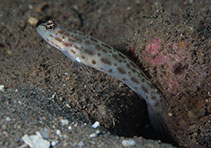| Family: |
Gobiidae (Gobies), subfamily: Gobiinae |
| Max. size: |
8 cm SL (male/unsexed) |
| Environment: |
reef-associated; marine; depth range 0 - 15 m |
| Distribution: |
Western Pacific: Ryukyu Islands to Queensland, Australia, east to Mariana Islands. Eastern Indian Ocean: Andaman Sea and northwest Australia (Ref. 9710); including China (Ref. 31517). |
| Diagnosis: |
Dorsal spines (total): 7-7; Dorsal soft rays (total): 11-12; Anal spines: 1-1; Anal soft rays: 11-12. Characterized by pale grey body color; side of body with four longitudinal rows of dark brown spots (midlateral row largest); presence of small ocellated yellow to orange spot between each pair of midlateral brown spot; head and body covered with scattered small yellow to brown spots; basal part of pectoral fin with intense white spot; longitudinal scale series 50-55; opening of gill extending to or slightly before vertical at posterior edge of preopercle; greatest depth of body 4.5-5.0 in SL; rounded caudal fin, about equal to head length (Ref. 90102). |
| Biology: |
Occurs on fine sand and silt bottoms of subtidal reef flats and lagoons to a depth over 20 m. Uses burrows of alpheid shrimps for refuge. Inhabits coastal sand slopes to about 15 meters depth (Ref. 48637). |
| IUCN Red List Status: |
Least Concern (LC); Date assessed: 27 August 2020 Ref. (130435)
|
| Threat to humans: |
harmless |
Source and more info: www.fishbase.org. For personal, classroom, and other internal use only. Not for publication.

